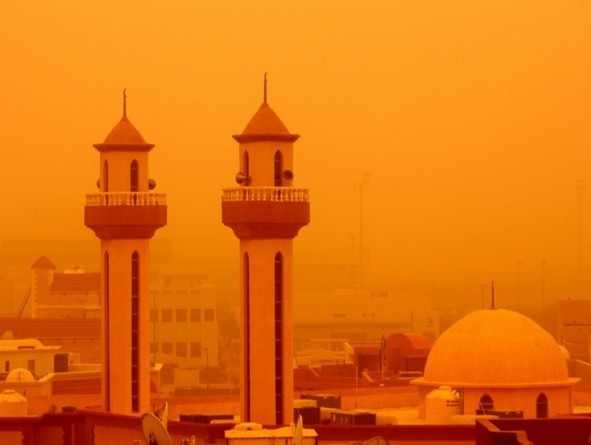By Ana Verayo, | May 03, 2016

Desert dust storms such as here in Kuwait could occur more often in the Middle East and North Africa as a result of climate change.
Researchers warn how large regions in the Middle East and North Africa will soon become uninhabitable by the year 2100, due to the dangerous effects of climate change.
According to Jos Lelieveld from the Max Planck Institute for Chemistry and the Cyprus Institute, the number of extremely hot days in the region is now twice the number since 1970, suggesting that this increase will reach up to five times by the end of this century.
Like Us on Facebook
To date, more than 500 million people currently dwell in the Middle East and North Africa, where Lelieveld and his team of researchers believe that climate refugees from that region can increase dramatically in the near future due to scorching hot temperatures.
In this new study, researchers compared data between 1986 to 2005, deriving predictions from 26 climate models during the same time period in order to project climate conditions into two future events. These two climate events will happen in 2046 to 2065 and from 2081 to 2100.
During these two separate climate event scenarios, greenhouse gases wll begin decreasing by 2045 and in one scenario, it will not. During both cases, these two scenarios will see a rise in temperatures that is predicted to happen during summer season.
NASA says that the temperature of the planet increased by 0.8 degrees Celsius since 1880, the dawn of the industrial revolution. However, Lelieveld says that even if this imminent increase can only reach a maximum of two degrees compared to pre-industrial temperatures by the middle of the century, the Middle East and North Africa will not experience a drop of temperatures below 30 degrees at night during their summer season.
This means that summer season in the Middle East and North Africa will have daytime temperatures of up to 46 degrees Celsius. By the end of 2100, midday temperatures can reach up to 50 degrees, producing heat waves 10 times stronger than what is occurring right now.
Apart from daytime and night time temperatures, the number of the hottest days in a year in these regions will eventually increase to 80 by 2050, from an average of 16 days recorded during 1986 and 2005. By the end of 2100, this number can increase up to 116 days.
Researchers also say that the climate in the majority of Middle East and North Africa will change so radically that it poses imminent danger to human life out there, which means all the citizens of those nations in these regions.
Lelieveld also adds that climate change will worsen living conditions there where prolonged heat waves and desert dust storms can transform some regions, making it no longer habitable, leading to a mass exodus of its people.
-
Use of Coronavirus Pandemic Drones Raises Privacy Concerns: Drones Spread Fear, Local Officials Say

-
Coronavirus Hampers The Delivery Of Lockheed Martin F-35 Stealth Fighters For 2020

-
Instagram Speeds Up Plans to Add Account Memorialization Feature Due to COVID-19 Deaths

-
NASA: Perseverance Plans to Bring 'Mars Rock' to Earth in 2031

-
600 Dead And 3,000 In The Hospital as Iranians Believed Drinking High-Concentrations of Alcohol Can Cure The Coronavirus

-
600 Dead And 3,000 In The Hospital as Iranians Believed Drinking High-Concentrations of Alcohol Can Cure The Coronavirus

-
COVID-19: Doctors, Nurses Use Virtual Reality to Learn New Skills in Treating Coronavirus Patients







